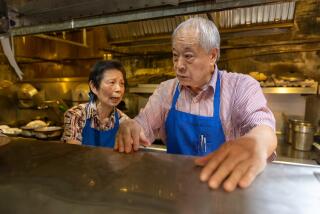A TASTE OF CAMBODIA : A Real Horatio Alger Story: Refugee Built Empire on Doughnuts
Ted Ngoy’s first job in America consisted of sweeping floors at a Lutheran Church in Tustin where he and seven penniless relatives lived in a small, single room without a shower.
Today, the family lives in a luxurious three-story 7,000-square-foot home equipped with its own dock on the bank of a private lake in Mission Viejo. Part of an exclusive gated community, the house cost $1 million four years ago.
“I am very happy,” said Ngoy, 46. “America is a miraculous country.”
Meet the Cambodian doughnut king of California. Owner of 25 Christy’s Doughnut shops from San Francisco to San Diego, he is one of the most successful Cambodian business executives in the country. Indeed, just 13 years after his arrival at Camp Pendleton as an impoverished refugee, Ngoy’s life is a classic American rags-to-riches tale.
The tale began in his native Cambodia, where he worked as a travel agent and tour guide. Despite the influence of a Chinese grandfather who had once owned a small grocery store, Ngoy, like most Cambodians, had little experience in business. Eventually, he opted for a career in the army where he ultimately became a major assigned to the Cambodian embassy in Bangkok, Thailand.
Then came 1975. Pol Pot’s communist Khmer Rouge took over. And, fearing for his life, Ngoy fled with his wife and three children aboard one of the first refugee airplanes to leave Asia for the West Coast.
“All the way over we just talked about having enough pigs and chickens to take to the market,” recalls Ngoy, who could speak no English then. “That was my dream.”
Instead, they ended up spending a month at Camp Pendleton in Oceanside while an American sponsor was sought. Eventually, the Tustin church stepped forward and hired him as its full-time janitor. To make ends meet, Ngoy took on two other jobs: as evening clerk at a local Builders Emporium and as a nighttime pump jockey at a local gas station.
It was at the night job, in fact, that he first encountered the strange American sweet that was to mold his destiny. Leaving Ngoy in charge one night, a fellow worker ducked over to a nearby doughnut shop to bring back some sugary snacks. “I didn’t know what it was, but I liked it,” Ngoy recalls of the treat. “I took some home and my kids liked it, too.”
Before leaving Thailand, he had managed to raise about $2,000 from the sale of various personal items. The day after being introduced to doughnuts, he says, he marched into the doughnut shop with all his cash and offered to buy the place. “They didn’t understand me,” Ngoy remembers. “They turned me down.”
Undaunted, the ambitious church janitor approached another establishment the next day with the same offer, this time a Winchell’s doughnut shop. And as fate would have it, instead of turning him away, they gave him an application for a manager-trainee program.
After spending a year managing a Winchell’s Donut House in Newport Beach, Ngoy--by saving his salary and borrowing from friends--purchased Christy’s, then only a single shop in La Habra. And, by the mid-1980s, the one shop had become 50.
Sees No Future in Field
Ngoy says he has helped many of his Cambodian employees start their own doughnut shops over the years and believes that he was instrumental in creating the rush of Cambodian refugees into the doughnut business. Some observers estimate that as many as 80% of the Cambodian-owned businesses in Southern California sell doughnuts.
But the man who started the trend now feels squeezed by it. “I see no future in doughnut shops,” he said, citing the intense competition he helped to create.
So Ngoy is going into hamburgers and tacos.
In the past three years, he said, he has sold half of his doughnut shops to buy Angelo’s Drive-in, an Anaheim drive-in restaurant with waitresses on roller skates, as well as the Taco Factory, a Mexican fast-food restaurant in Tustin. And lately, he says, he’s been investigating the field of fast photo processing.
“I don’t want to compete with my own people,” the erstwhile janitor explained. “America is a big, wide-open country.”
More to Read
Sign up for Essential California
The most important California stories and recommendations in your inbox every morning.
You may occasionally receive promotional content from the Los Angeles Times.










